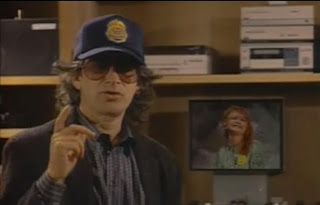
I saw this new TCM documentary last night. Apparently Richard Schickel has decided to make a cottage industry out of breezy interview-documentaries about every major American filmmaker, which he can then sell as DVD bonus features.
Anyway, it's an entertaining enough little documentary, but it stays very surface-level and never peers into the depths of Spielberg's work or his complexities as an artist. This is primarily because the movie is literally Spielberg telling his own story, and so he's free to rehash all his old stories and spin some new ones, from the comfort of his own perspective. Present are his stories about his youth and inexperience in the late 1960s, the agonies of making Jaws, the failure of 1941, his uncertainty over The Color Purple, and the controversy of Munich. I was happy to see Spielberg defend the present-day bookend scenes of Saving Private Ryan (essential for grounding the film in the present) and the brilliant ending of A.I. (part of Kubrick's original bitterly ironic treatment, not tacked on out of misguided sentimentality by Spielberg).
Not present are other stories, like his upbringing and background as a geeky suburban child of divorce; his Jaws-related Oscar embarrassment, and the strife with Verna Fields over her contributions to the film's success; his role as producer and the problems that plagued Twilight Zone: The Movie and Poltergeist; the problems of racism and violence in Temple of Doom; the failures of Always and Hook; and any significant mention of Last Crusade, Amistad, The Lost World, Catch Me If You Can, or The Terminal. When politics are mentioned, as in regard to Spielberg's critiques of governmental surveillance in Minority Report or bureaucracy in The Terminal, or our responses to terrorism in War of the Worlds or Munich, Schickel and Spielberg discreetly downplay the controversies as if to deny that any of those films contained anything that could even be considered controversial or problematic.
What I'd love to see is an objective documentary about the man (who I consider to be one of the three or four greatest living filmmakers, by the way) that goes into all the ups and downs of Spielberg's career, including a true critique of his artistic achievements and failures, including a look at his discomfort with portraying adult romance and sex, his influence on modern blockbusters, and so on. As one of the most compelling, successful, and influential filmmakers of our time, his work demands more than a puff-piece retrospective.


No comments:
Post a Comment